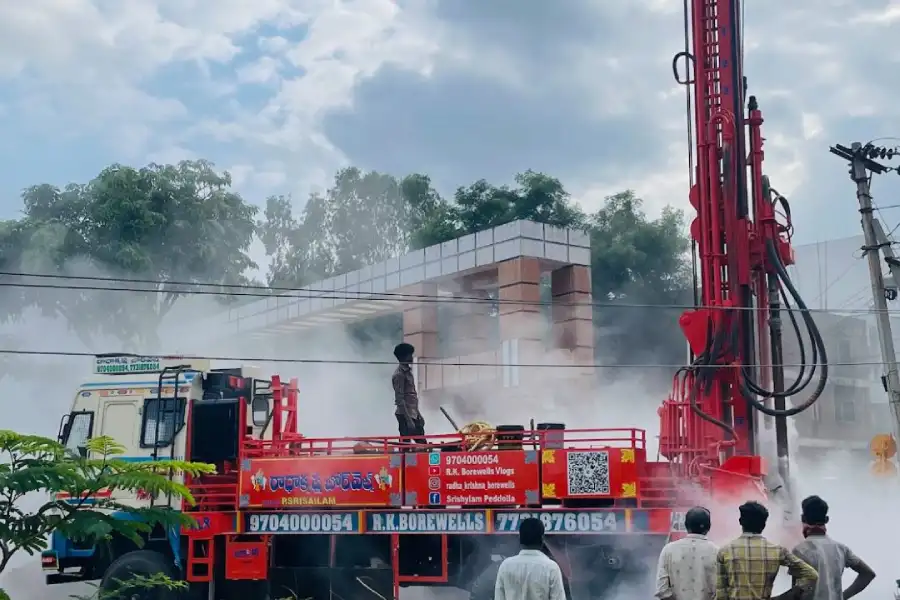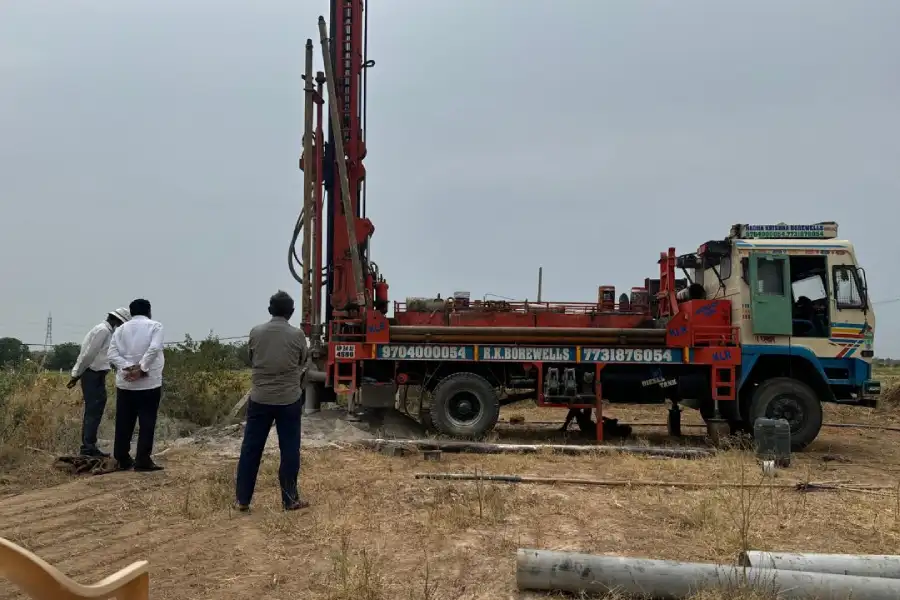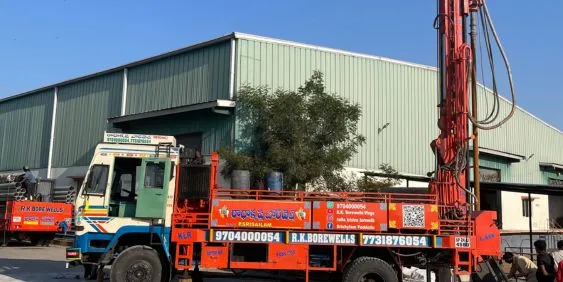Copyright © 2024 RADHA KRISHNA BOREWELLS, All rights reserved. Design by FareWorks
At Radha Krishna Borewells, we offer expert earthing hole drilling services across Hyderabad and Telangana. Proper earthing is critical to the safety and functionality of electrical systems in homes, commercial buildings, and industrial sites. Our professional earthing hole drilling ensures that your electrical grounding is secure and efficient, protecting against electrical faults and surges.
With over 30 years of experience, our skilled team uses advanced equipment to provide reliable earthing solutions for residential, commercial, and industrial projects.



Our commitment to quality and efficiency ensures that each earthing hole is drilled with precision, providing a secure and reliable electrical grounding system. At Radha Krishna Borewells, we offer customized and affordable earthing solutions tailored to meet your specific needs, ensuring your satisfaction regardless of the size or scope of the project.
An earthing hole is drilled to create a grounding system for electrical installations. It is a vital part of the electrical infrastructure that provides a safe path for excess electrical current to flow into the ground, preventing damage to appliances and ensuring the safety of people in the building. Earthing systems are mandatory in both residential and commercial properties, as they protect against electrical faults and surges.
At Radha Krishna Borewells, we follow a systematic approach to ensure your earthing system is installed effectively, safeguarding your property and electrical systems:
Objective: To evaluate the location and determine the ideal spot for drilling the earthing hole.
Process:
Our team of experts conducts a thorough assessment of the site, examining the soil type, moisture levels, and electrical system requirements to identify the most appropriate location for the earthing hole. Soil conductivity plays a critical role in how well the earthing system will function. We ensure that the chosen spot will provide optimal performance for dissipating electrical currents into the earth.
Why It’s Important: The success of the earthing system largely depends on the correct placement of the earthing hole. A well-conducted site assessment ensures that the system will provide long-term reliability.
Objective: To create a precise and suitable hole for placing the earthing electrode or rods.
Process:
Using advanced drilling equipment, we drill the earthing hole to the necessary depth based on site conditions and project requirements. For most residential or commercial projects, this involves drilling to a depth of around 3 to 5 meters, but for larger industrial projects, it may require deeper drilling. The hole needs to be wide and deep enough to ensure proper contact with the surrounding soil, facilitating the discharge of electrical energy into the ground.
Why It’s Crucial: A properly drilled hole ensures that the earthing rod is securely placed and in good contact with the surrounding soil, maximizing the efficiency of the system.
Objective: To securely place the earthing rod or electrode that will transfer the electrical charge into the earth.
Process:
After the earthing hole is drilled, we carefully install the earthing electrode or copper rod. These rods are typically made from copper or galvanized iron, chosen for their high conductivity and corrosion resistance. The rods are driven deep into the ground, and special attention is paid to ensuring they are firmly positioned for maximum efficiency.
Why It’s Essential: The quality and placement of the earthing rod directly impact the system’s ability to handle electrical faults and surges. The rod must be correctly installed for effective grounding.
Objective: To improve the conductivity of the soil surrounding the earthing electrode.
Process:
Once the electrode is installed, we backfill the hole with a special mixture of conductive materials, such as bentonite, salt, and charcoal. These materials help to improve the soil’s conductivity, ensuring that electrical energy can be effectively transferred to the earth. This step is particularly important in areas where the natural soil conductivity is low, such as in dry or rocky regions.
Why It’s Beneficial: The use of conductive materials around the earthing rod enhances the performance of the earthing system, ensuring it functions effectively even in less-than-ideal soil conditions.
Objective: To verify that the earthing system is functioning correctly and meets safety standards.
Process:
After installation, we conduct thorough resistance testing to measure the effectiveness of the earthing system. We use specialized testing equipment to ensure that the resistance level is within the acceptable range, typically below 1 ohm for most applications. This testing ensures that the earthing system will reliably protect against electrical faults and provide a safe discharge path for fault currents.
Outcome: A fully tested and verified earthing system that meets industry safety standards and protects your property from electrical hazards.
When it comes to choosing a company for borewell drilling in Hyderabad or Telangana, Radha Krishna Borewells stands out for several reasons. Here’s why customers trust us with their borewell drilling projects:

Over 30 years drilling expertise in challenging geological conditions.
Latest drilling tech for precise, deep borewell drilling in any terrain.
Competitive pricing for borewell drilling, repair, and maintenance services.
Quick borewell drilling with minimal disruption, completed in days.
Hear from our satisfied clients across Hyderabad and Telangana who have trusted us with their Earthing Holes needs.
Here are answers to some of the most frequently asked questions about Earthing Holes, maintenance, and repair services. If you have any other questions, feel free to reach out to us.
1.What is the purpose of an earthing hole?
An earthing hole provides a path for electrical currents to safely dissipate into the ground, protecting against electrical shocks, faults, and surges.
2.How deep should an earthing hole be for optimal performance?
The depth of an earthing hole typically ranges from 6 to 10 feet, but can vary depending on soil conditions and the electrical requirements of the installation.
3.What materials are used for earthing rods?
Copper or galvanized steel rods are commonly used because of their excellent conductivity and corrosion resistance, ensuring long-lasting performance.
4.How long does it take to drill and install an earthing hole?
The time needed depends on soil conditions and the depth of the hole, but it usually takes a few hours to complete the drilling and installation process.
5.Can earthing holes be drilled in rocky or hard soil?
Yes, with the right equipment and techniques, earthing holes can be drilled in challenging soils, including rocky or compact ground.
6.How can I check if my earthing system is working properly?
Regular testing using earth resistance meters can ensure the system is working effectively. A resistance reading below 1 ohm is generally considered optimal.
7.How often should an earthing system be inspected or maintained?
It’s advisable to inspect and test the earthing system every 2-3 years to ensure it is functioning properly and safely.
8.What factors affect the performance of an earthing system?
Factors like soil moisture, salt content, temperature, and installation depth can all affect the performance of an earthing system.
9.Can earthing holes be installed in urban areas or confined spaces?
Yes, earthing systems can be installed even in confined or urban spaces, as long as the proper drilling equipment is used to access the ground.
10.What is the cost of installing an earthing hole?
The cost depends on factors like soil conditions, depth of the hole, and type of earthing rod used, but we offer customized solutions to fit various budgets and requirements.
Are you looking for reliable Earthing Holes services in Hyderabad or Telangana? Contact Radha Krishna Borewells today for a free consultation and site survey. Our team is ready to help you access a reliable water source with our professional drilling, repair, and maintenance services.

Providing expert borewell drilling, repair, and maintenance services across Hyderabad with over 30 years of trusted experience.
